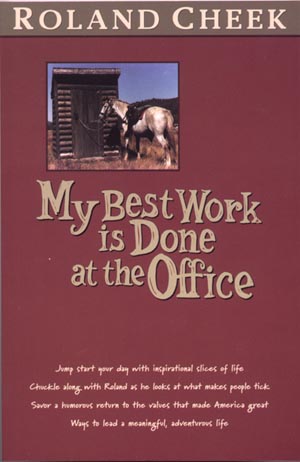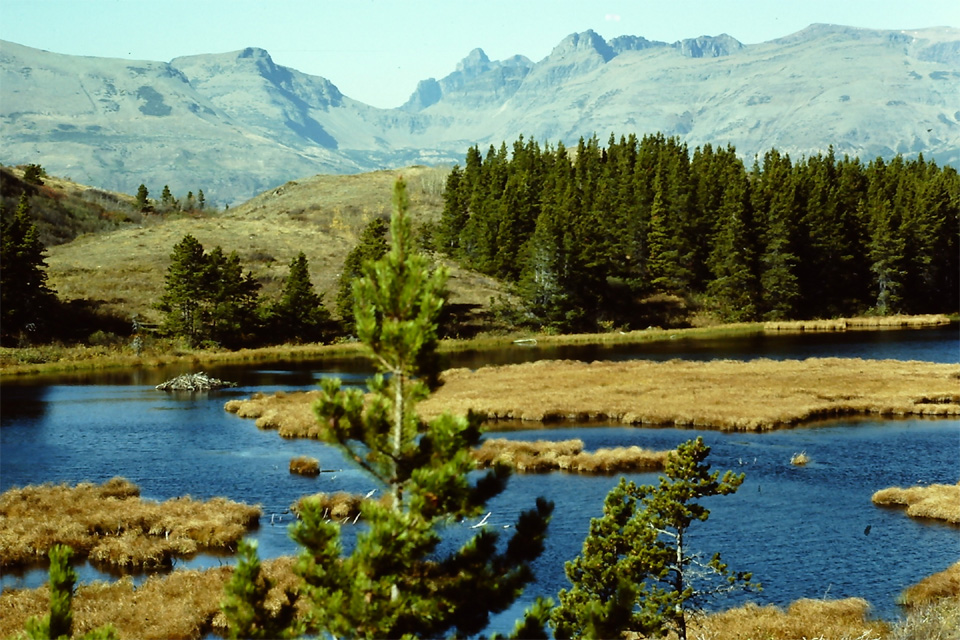
There was this boy, see? He pedaled out on a broken-down bicycle to ask what was up. It was while me and one of the hands moved a bunch of tailed-up horses along a graveled county road to a pasture south of the home place.
The boy's sandy hair needed trimming and his hands could have stood a dash more soap and water than they'd seen since the Ides of March. He'd blown one knee on his britches and elbows played hide and seek through holes in the sleeves of his shirt. As he pedaled, the boy jerked up on the bike's loose handlebars to keep 'em in reach.
Staring down from the saddle, I could see his head would only top out about my belt buckle, even though he must be heading toward his teens.
He wasn't shy, this kid. He pedaled right along with us, and after I'd explained what we were doing with the ponies, he asked about individual ones. Was that pinto a good riding mare? Could any of `em singlefoot? Did all of `em pack and ride? That's how I knew the lad was no novice about horses. So I asked him about his own self.
The kid had to brake the bicycle by holding the toe of a worn-out tennis shoe against the front tire. I could see he wore no socks because his right pantleg was rolled up to keep the unguarded bicycle chain from snagging it--just like I did at his age. Sometimes I didn't wear shoes, neither. But, then, my bicycle's brakes worked.
The boy said there was a whole bunch of kids in his family, including a twin sister. And when I asked what his father did, he told me, "Nothing right now. He got hurt at work."
I gazed down at the top of the kid's head bobbing as he pumped his bike alongside and he glanced up about that time, telling me without saying so that he'd rather be riding alongside this string of horses than doing anything else. "You like horses?" I asked.
"Yep. I got one."
"You don't say. Tell me about it."
The boy's horse was a gelding. A little long in the tooth now, but willing. He also told how a couple of his older brothers were trying to make the big rodeo circuit and how he was riding bucking stock in whatever "Little Britches" rodeos they held around the country.
I twisted in the saddle to check out Dan and our plodding horse string. Little puffs of dust was kicked up by the ponies' hooves and a couple shook off horseflies.
The boy wheeled his bike in a u-turn and drifted to the rear to ride alongside Dan. But he was back by my side in a couple of minutes--I could've told him the taciturn wrangler wasn't strong on conversation.
I got troubled as our horse string plodded farther and farther from the boy's home. "Hadn't you better ride on back?" I said. "Your momma will be out looking for you."
"Naw. I'm going with you to your pasture. Won't nobody miss me."
When we got to the lower pasture, the boy helped Dan and me untie our ponies and put `em in the gate. Then when Jane got there with the pickup truck, we threw our saddles and the boy's clattletrap bicycle in the back and took the lad home.
It's fair to say I took a liking to that kid. When school started, I learned from his teacher that the boy's mother had died the winter before, victim of the big C, and that he'd had a few problems adjusting. I tried interesting the lad in reading, starting him out with Smokey and Shane, books about horses and the West; subjects of more than a little interest to him.
And we took him along on a couple of trips to the Bob Marshall Wilderness when we packed hay and cut firewood in preparation for the fall hunts. And when spring came....
* * *
When I stepped away to straighten and knead my back, the boy stretched to his tiptoes and peered through the spotting scope. His eyelid fluttered while his pupils adjusted; then he gasped. Centered within his field of view were twenty-seven bighorn rams, most of them lying about, contentedly chewing their cuds.
"Wow! Did you see that big one up at the top? And there's two of `em butting heads and playing! They're all over the place!"
I grinned and glanced at Jane. She swept distant ledges above the rams, searching through binoculars for mountain goats.
"And ... and there's some over to the side with smaller horns!" the boy continued.
"They're mommas," Jane said. She turned her glasses to peer again at the sheep. "Horns of ewes are always smaller." It'd been quite a day--and with lunchtime still to come. We'd left home after an early breakfast, with the objective of spotting wildlife and maybe doing a little crosscountry skiing. As luck and experience would have it, we'd already counted nearly two hundred elk along Glacier National Park's southern and eastern mountain fronts, including a couple of dandy bulls still carrying their six-point antlers. And we found over a dozen shaggy, snow-colored mountain goats gamboling on cliff faces and rock ledges of a natural mineral lick near Essex and U.S. Highway 2: blocky billies, razor-horned nannies, and half- grown kids tucked against their mothers' sides.
There'd been deer we ignored as being too common, and a fox posturing in a meadow near East Glacier. Then we headed for Many Glacier, where we hoped to spot bighorn sheep.
While we waited for a green light in downtown Browning, the boy had said, "I've never seen a wild sheep. Do you think we'll see some?"
I glanced at Jane over the top of the lad's head and winked--bighorn viewing is as near to a cinch as any wildlife viewing could be in this part of Glacier. The light blinked green and I cranked the station wagon onto the straight, fast, and featureless Duck Lake Road. "Well, let's try to find you a couple."
Now the lad was looking at his first wild sheep. "Enough there to tickle your interest?" I asked when he finally allowed Jane a peek through the scope. His grin was so wide I thought his ears might topple into the toothy mouth.
Jane moved away from the scope and the boy leaped again to the eyepiece. The sheep were lounging across a steep, south-facing hillside where only scattered snowdrifts lay, burned down by melting sun and chinook winds. The valley where we stood was still shrouded in white, however--still weeks away from green grass and sunburned tourists.
"Well," Jane said, "do you want to hike up there where there's no snow and try to get closer to those sheep? Or would you rather stay down here and go skiing?"
The boy shrugged. "I don't care." Then he considered what he'd just said, mulling over the possibility that we might do the unthinkable. "I ... I guess I'd rather hike up to the sheep."
There must be something about good-looking older women, stove-up mountain stompers, and wide-eyed and freckled 12-year-old boys that is comforting to a band of bighorn rams because they never seemed to spot us during our hour-long approach. Stranger still, none took alarm during our stomach-slithering short stalk. And strangest of all, they even seemed indifferent after we'd snapped all our film, clambered to our feet, and strolled among them.
"Gee," the boy said as he paused to stare at one cud-chewing ram that sported broomed-off horn tips and a near-white muzzle, "how far away is he?"
"Twenty feet. Why?"
"I've got a horse at home that's wilder than these."
* * *
As attractive as the thought might be, few of us chronologically inconvenienced folk would agree to return to our youth unless first guaranteed we could retain our present level of intelligence. Yet we who are experienced seem to lose the joy of youth's exuberance. How can we retain discovery's sense of wonder when we've already been there and done that? Where's the challenge? The anticipation? The thrill?
I've learned a great deal about returning to youth's enthusiasm. The return came through the eyes and the exclamations of a twelve-year-old boy stretching to his tiptoes to peer through a spotting scope at his first bighorn ram. It came via that same boy pedaling a rattletrap bicycle for five miles alongside a plodding string of horses so he could rap with the lead cowboy.
It comes through giving and sharing, instead of getting and keeping.

